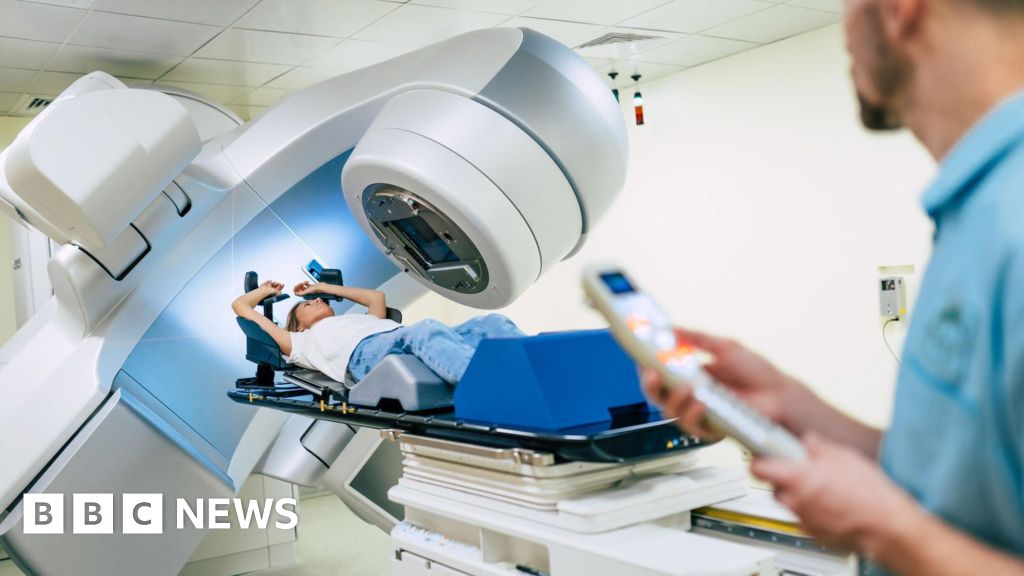Philippa RoxbyHealth reporter and
Jim ReedHealth reporter
Senior cancer doctors are warning that excessive red tape means some patients in England are struggling to access the latest cancer treatments.
The Royal College of Radiologists (RCR) says bureaucracy is “stifling innovation” and that applying for funding to pay for new treatments can be “cumbersome” for some cancer centres.
It says the situation is leading to an unacceptable postcode lottery with some cutting-edge treatments only available in the larger, better-funded units.
The government says a new cancer strategy, due later this year, will “put the NHS back at the forefront of global cancer care”.
Doctors and scientists say we are living through a golden age of cancer treatment, with new breakthroughs now changing the way patients are cared for.
Survival rates for many common cancers have been rising, partly driven by new technologies such as immunotherapy drugs and more advanced radiotherapy.
But the body representing both radiologists, who analyse scans and treat patients, and cancer doctors says that NHS bureaucracy means some are missing out on the latest life-saving treatments.
The RCR says that even some well-established advances, such as Stereotactic Ablative Body Radiotherapy – or SABR – can still be difficult to access.
SABR is a way of more accurately targeting the disease with a precise dose of high-strength radiation, and is typically used to treat very small tumours in the lungs, liver, lymph nodes and brain.
The RCR says individual cancer units still have to apply to NHS England to fund its use, leading to a postcode lottery where some patients lose out.
“That is inequitable and unjust and not compatible with the National Health Service,” says Dr Nicky Thorp, a practising cancer doctor and vice president for clinical oncology at the RCR.
“We would like red tape to be cut and the commissioners to listen to clinicians who really understand the impact on patient care,” she added.
Both the RCR and the Society of Radiographers have written to the government asking for SABR to be made more easily available, along with other cutting-edge treatments such as some immunotherapy medicines and molecular radiotherapy, which uses radioactive drugs to target cancer cells.
NHS England says every hospital trust that is delivering radiotherapy is able to offer SABR, and it is committed to a more “streamlined approach” to expanding its use.
‘Life-saving’ treatments
Ray Bowen, 76, from Middlesborough had one of his kidneys removed in 2019 after being diagnosed with cancer.
In 2022 a scan showed the disease had returned in his second kidney and he was told surgery would not be possible.
“At best that meant I would have needed to be put on dialysis which I really would not have fancied,” he said.
Instead the former soldier and shipyard worker was given SABR radiotherapy to treat the cancer with high-dose radiation and, three years on, he says he’s doing well.
“I just feel very lucky,” he said. “Not long ago something like this wouldn’t have even existed.
“It’s a magic treatment and without doubt it needs to be more available.”
New cancer strategy
The call by cancer doctors comes as the government prepares to publish its long-awaited cancer strategy for England, now expected later this autumn.
The charity Cancer Research UK (CRUK) said it should include a new commitment to diagnose cancers earlier after a new report found that only half of people diagnosed with cancer after an urgent referral are getting the news within the target 28 days.
For some cancers, such as bone, bladder, kidney and head and neck, only around a third of people receive a diagnosis within the target time.
Between 2021 and 2024, the situation for people being diagnosed with cancer has been getting worse, the charity says.
But, in contrast, those who don’t have cancer after an urgent referral – which is the large majority of people – are informed more quickly, with 75% told the good news within the target time.
“It’s promising that more people are having cancer ruled out on time, helping to put their minds at ease,” says Cancer Research UK chief executive Michelle Mitchell.
“However it’s unacceptable that only half of people who have cancer are being diagnosed within the target timeframe.”
Follow-up tests to confirm the presence of cancer, particularly complex ones, and what type it is can cause delays in diagnosis. This can lead to delays in starting treatment too.
Jon Shelton, head of cancer intelligence at CRUK, says this process “is taking too long” and tests need to be carried out “as quickly as possible”.
A spokeswoman for NHSE England said the health service is seeing and treating more cancer patients than ever before, while rolling out new initiatives, such as home tests and mobile scanning trucks, to diagnose the disease earlier.
The Department of Health described cancer care as an urgent priority and said its upcoming national cancer strategy would give patients “the most cutting-edge care”.
“Our plan for change is already making an impact, with 148,000 more people having cancer diagnosed or ruled out within 28 days from July 2024 to June 2025 compared to a year earlier,” a spokesman said.
Source link : https://www.bbc.com/news/articles/c4gz3py0dwvo?at_medium=RSS&at_campaign=rss
Author :
Publish date : 2025-09-11 01:09:00
Copyright for syndicated content belongs to the linked Source.
